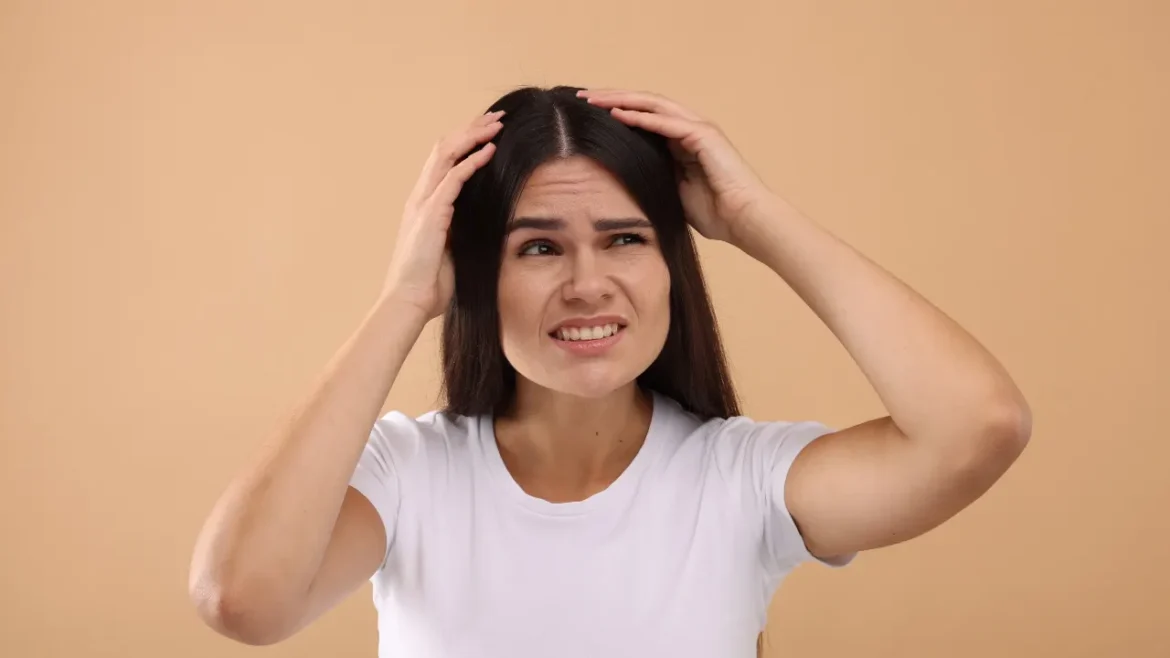Description
The common skin problem known as dandruff causes flaking and itching on the scalp. Small, dead skin flakes that are white or yellowish drop from the scalp as well onto the shoulders, which are its defining feature. In severe situations, dandruff can result in hair loss and make the scalp red and inflamed. Although it can happen at any age, dandruff is more prevalent throughout adolescence and the early stages of adulthood.
You May Also Like:
FINDING THE BEST TURKEY TAIL MUSHROOM POWDER: 5 TOP BRANDS REVIEWED
FINDING THE BEST LION’S MANE MUSHROOM SUPPLEMENT: 5 TOP BRANDS REVIEWED
Dandruff: Description, Causes, And Treatment Protocol is an original (HealthXWire) article.
Possible Causes
Although the specific cause of dandruff remains unknown, it is thought to be a result of several things, including the following:
Seborrheic Dermatitis:
This common skin ailment causes the skin to become red, itchy, and flakey, particularly on the scalp, the face, and the upper chest. Yeast-like fungi known as malassezia, which is typically present on the skin yet can spread beyond control in some people, and it can be the source of seborrheic dermatitis. This fungus causes the irritation and flaking.
Oily or Irritated Skin:
Dandruff can also result from oily skin of the scalp because too much oil can accumulate there and trap cells that are dead, causing flaking and irritation. Dandruff can also result from scalp irritation brought on by abrasive shampoos, hair care items, or tight-fitting headgear.
Diet:
According to several research, a diet rich in fats and sugar may promote the growth of dandruff in addition to other skin disorders including acne.
Hormonal Changes:
Dandruff formation can be influenced by hormonal changes that occur throughout puberty, pregnancy, and menopause.
Dry Skin: In particular, dandruff and flaking skin around the scalp can occur during the winter given that the dry air alongside interior heating can exacerbate the condition.
Medical Conditions:
Dandruff can also be related to certain medical diseases like eczema, psoriasis, and Parkinson’s Disease.
Exacerbating and Mitigating Factors
The redness, itching, and irritation from dandruff on one’s scalp can be humiliating and irritating, despite not being a significant health problem. Numerous variables can exacerbate or reduce the effects of dandruff.
The exacerbating factors include:
Yeast Overgrowth:
Dandruff can develop as a result of the excessive growth of yeast, which can be driven by stress, bad hygiene, and a compromised immune system.
Dryness of the Skin:
Dry skin is caused by cold weather, low humidity, and harsh shampoos which can lead to the formation of dandruff.
Food Habit: According to several research, a diet rich in fat and sugar can worsen the condition.
Some Hair Products: Some hair products, like hair gels and sprays, can aggravate the scalp and result in the development of dandruff.
The mitigating factors for dandruff include:
Hydration:
Maintaining healthy skin, specifically the skin on your scalp, and lowering the chance of acquiring dandruff depend on being hydrated.
Mild Shampoo:
Dandruff can be prevented by using a mild, moisturizing shampoo.
Good Hygiene:
Dandruff can be prevented by following good hygiene habits, including washing hair frequently and not sharing products used for hair care.
Medicated Shampoo:
Coal tar, salicylic acid, and ketoconazole are among the components of medicated shampoos, which are used to treat yeast overgrowth along with seborrheic dermatitis and return the scalp’s natural equilibrium.
Stress Management:
Managing stress through techniques such as exercise, meditation, and deep breathing can help reduce the risk of developing dandruff.
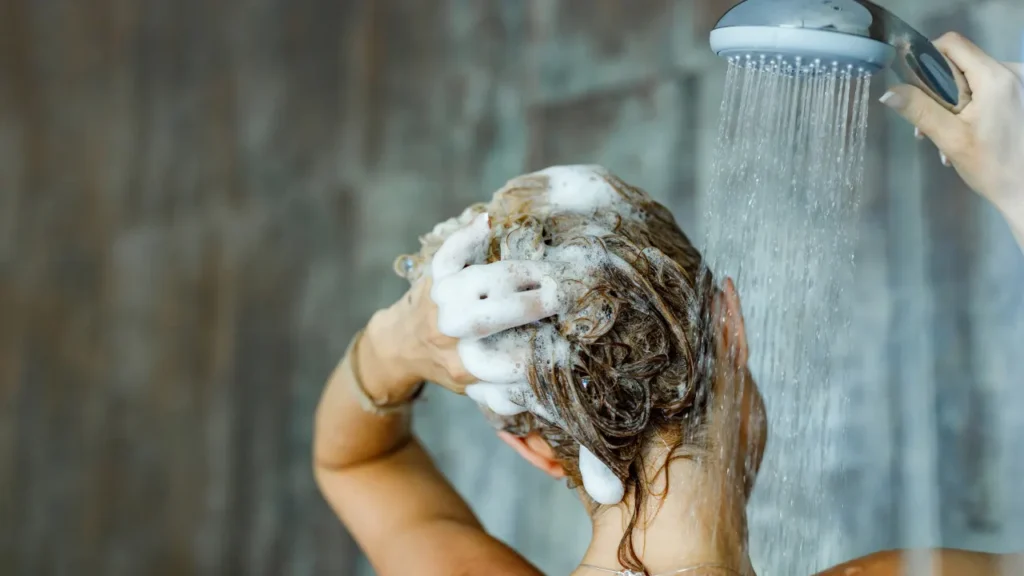
Standard Treatment Protocol(s)
Using over-the-counter shampoos that treat dandruff with active ingredients like the ones listed below is a standard part of treating dandruff:
- Pyrithione Zinc
One of the main active components found in the majority of shampoos that fight dandruff includes pyrithione zinc. Inflammation and yeast growth on the scalp are both decreased, which is how it functions.
- Salicylic Acid
Salicylic acid is another active ingredient that can be found in anti-dandruff shampoos. This ingredient helps to soften and loosen dead skin cells on the scalp, making them easier to remove with regular shampooing.
- Selenium Sulfide
A third active component that is frequently found in anti-dandruff shampoos comprises of selenium sulfide. It functions by decreasing inflammation and the formation of yeast in the scalp.
- Ketoconazole
A prescription antifungal drug called ketoconazole works by inhibiting the development of yeast in the scalp, thereby easing flaking and irritation.
Typically, you must use them at least twice a week, and the anti-dandruff shampoos must be applied as prescribed and kept on one’s scalp for a short time before being rinsed out. Prior to noticing a change, consistent usage may be required for a few weeks.
It is important to maintain regular scalp hygiene along with using anti-dandruff shampoos. Regular hair washing, eliminating harsh hair treatments, and refraining from scratching the scalp are all part of wellness.
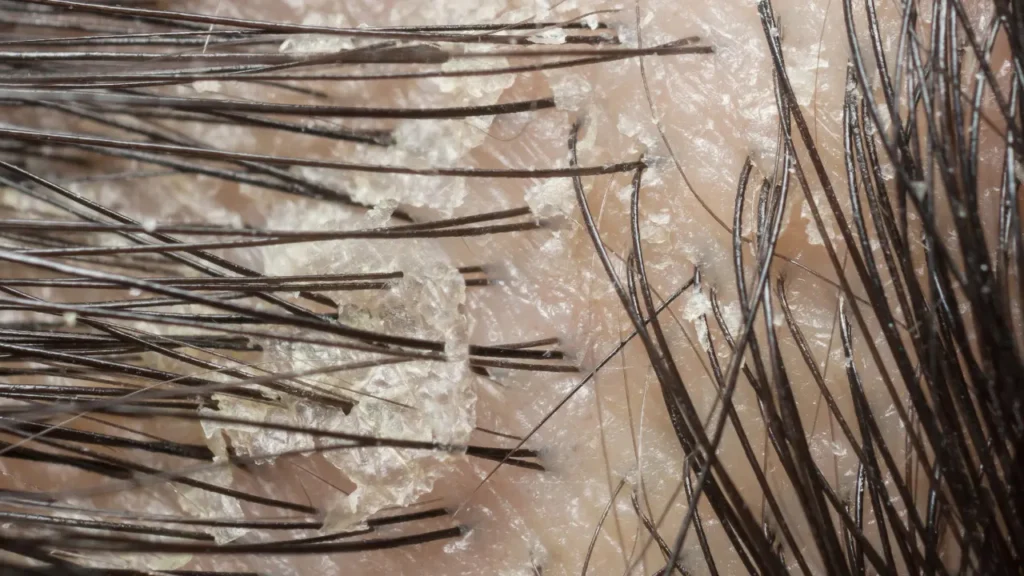
Treatment Options
The following are a few additional treatment methods that can be useful in managing and reducing the indications of dandruff as an alternative to regular treatment protocols:
Over-the-Counter Formulations:
There are multiple over-the-counter products that, in conjunction with anti-dandruff shampoos, can prove useful in treating dandruff. The following are some of them:
- Scalp Oils
Natural oils like tea tree oil, coconut oil, or jojoba oil are frequently used to make scalp oils. These kinds of oils can help hydrate the scalp, decrease swelling, and stop flaking. Prior to washing the hair, the scalp must be treated with scalp oils and allowed to sit for a while.
- Scalp Masks
Another option for treating dandruff is a scalp mask. Usually, these masks contain nutrients like honey, yogurt, or aloe vera, that can hydrate the scalp and soothe inflammation. Before shampooing the hair, a scalp mask must be applied to that region.
- Scalp Scrubs
The management of dandruff can benefit from using scalp washes. These scrubs frequently include components that exfoliate the skin, like salt or sugar, which can aid in getting rid of dead skin cells along with extra oil that accumulates on the scalp. Depending on how bad the dandruff is, you should apply a scalp scrub only once or twice per week.
Prescription Medications:
A doctor might recommend a stronger prescription for more severe instances of dandruff in alongside over-the-counter shampoos for treating dandruff. Oral anti-fungal drugs, topical corticosteroids, and anti-fungal creams can all be prescribed treatments. Topical corticosteroids reduce scalp irritation and inflammation by doing this. Yeast development on the scalp is inhibited by anti-fungal lotions and oral anti-fungal medicines.
Topical Corticosteroids:
Anti-inflammatory medications called topical corticosteroids can help decrease scalp inflammation. If one experiences itching or redness along with dandruff, these can be recommended.
Topical Anti-fungal Agents:
For dandruff brought on by an infection caused by fungi, doctors can prescribe topical anti-fungal medications. These substances can aid in limiting the development of yeast on one’s scalp.
Phototherapy:
For severe cases of dandruff that fail to respond to previous treatments, photo therapy which is also called light therapy, might be suggested. This includes subjecting the scalp to particular light wavelengths, which can help lower inflammation and limit the spread of yeast in the scalp.
Nutritional Supplements:
There exist multiple nutritional supplements which can be useful in treating dandruff, even if no one supplement has been proven to be a successful treatment for the problem. The following are some of them:
- Omega-3 Fatty Acids
Essential nutrients called omega-3 fatty acids have anti-inflammatory and skin-health benefits. They are present in supplements and also in fatty fish like salmon and tuna.
- Vitamin D
The immune system and good skin depend on vitamin D. It may be acquired either naturally or through supplementation.
- Zinc
Zinc is a crucial mineral that helps boost the immune system health and lessen inflammation. It can be found in dietary supplements but also in foods including oysters, steak, and pumpkin seeds.
- Probiotics
Probiotics are good bacteria that can enhance immune system health and lessen inflammation. They are present in supplements in addition to foods that have undergone fermentation, like kefir and yogurt.
Natural and Herbal Remedies:
Dandruff can be treated with a variety of natural and herbal therapies. The following list comprises them:
- Aloe Vera
The natural anti-inflammatory along with moisturizing properties of aloe vera can help calm and hydrate the scalp. Direct application to the scalp is possible, followed by a brief period of time before rinsing.
- Tea Tree Oil
The natural anti-bacterial and anti-fungal properties of tea tree oil can help prevent the development of yeast on your scalp. It can be applied topically by combining some of the drops of oil from tea trees with a carrier oil like jojoba oil or coconut oil followed by rubbing it into yourscalp. It may also be used as a gentle shampoo.
- Coconut Oil
Coconut oil naturally moisturizes the skin and offers anti-inflammatory benefits. Prior to washing the hair, it can be applied straight to your scalp and then be left alone for a while.
- Apple cCder Vinegar
When the pH balance on your scalp is restored, the development of yeast is inhibited owing to the natural antibacterial and anti-fungal properties of apple cider vinegar. After shampooing, one may use it for rinsing by stirring it with water.
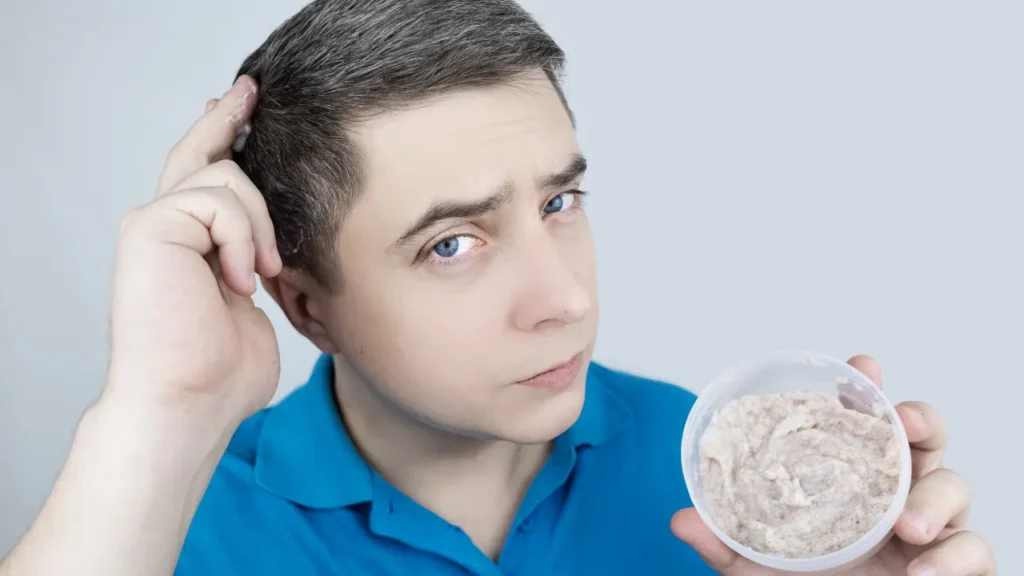
Conclusion
Although common and mostly treatable, dandruff can still be uncomfortable, take a long time to get rid of, and can even be embarrassing if it gets too out of control and become very noticeable. By taking the steps mentioned in this article and trying one or more of the suggested treatments and therapies, you may be able to get rid of it completely and start living your life more comfortably. Before trying any of these supplements and treatments, it is reccomended that you first talk to your doctor.
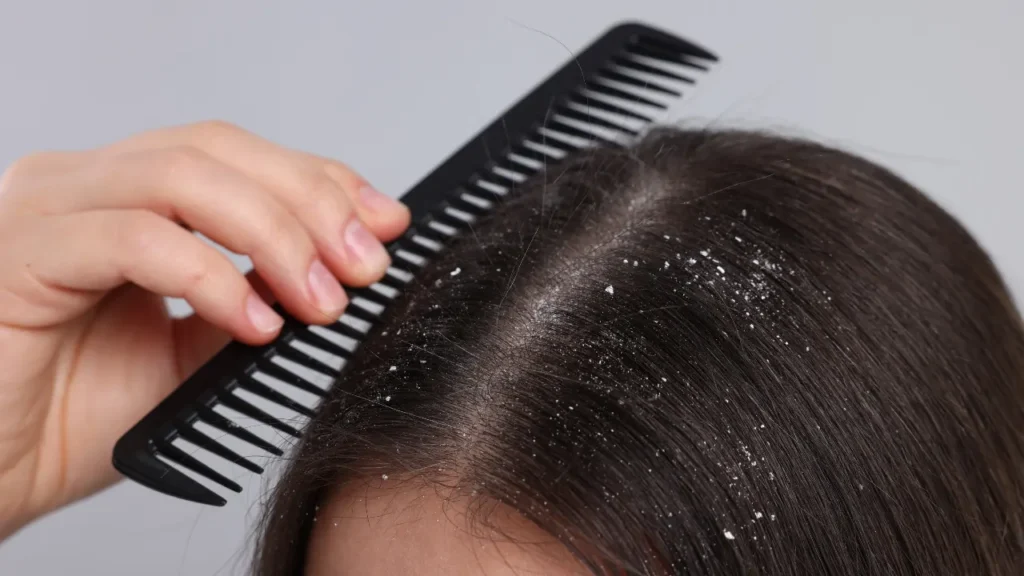
Additional resources for further reference
https://www.mayoclinic.org/diseases-conditions/dandruff/symptoms-causes/syc-20353850
https://www.aad.org/public/everyday-care/hair-scalp-care/scalp/treat-dandruff
https://www.everydayhealth.com/dandruff/guide/
https://www.healthline.com/nutrition/ways-to-treat-dandruff
Important Note: The information contained in this article is for general informational purposes only, and should not be construed as health or medical advice, nor is it intended to diagnose, prevent, treat, or cure any disease or health condition. Before embarking on any diet, fitness regimen, or program of nutritional supplementation, it is advisable to consult your healthcare professional in order to determine its safety and probable efficacy in terms of your individual state of health.
Regarding Nutritional Supplements Or Other Non-Prescription Health Products: If any nutritional supplements or other non-prescription health products are mentioned in the foregoing article, any claims or statements made about them have not been evaluated by the U.S. Food and Drug Administration, and such nutritional supplements or other health products are not intended to diagnose, treat, cure, or prevent any disease.
Table of Contents

